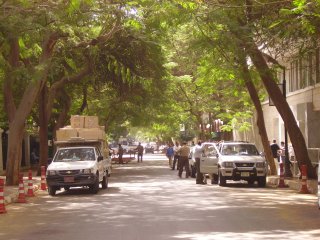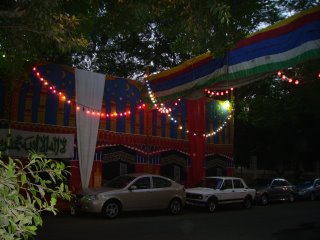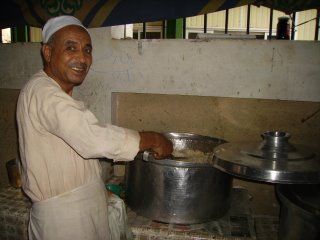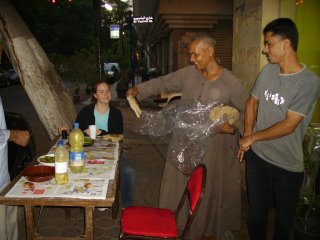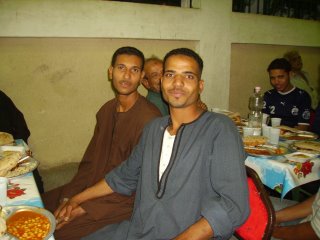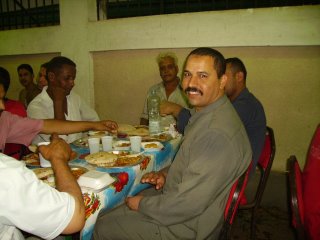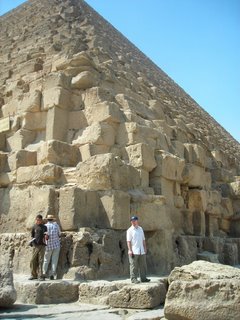This is the first post about our trip to the Bahariya Oasis, which yielded all matter of encounters. I’m starting with the second day. After breakfasting on feta, baladi bread, fava beans, and NesCafe in the salmon-walled dining room of the Western Desert hotel, we loaded up in the hotel’s blue jeep and admired the white flames painted on the side. J had requested that awesome jeep from Samir, the manager, and since we were basically the only ones in the hotel, he obliged. We climbed in with Samir and Mahmoud, our driver, who played Arabic music in the car all day and sang nonstop as he whipped around rocks and bumped us through the Western Desert.
Our first stop was an enormous dune not far from town – the culmination of our drive was the jeep picking up speed to make it up to the lower elevation of the dune. A dune is a miraculous thing, but there is not much more I can say except that I collected some beautiful rocks and marveled over the way the sand had smoothed crevices into them.
Next we entered the Black Desert, where the sand was covered with rocks that looked like a layer of pepper from a distance. We stopped at Black Mountain, one of the largest formations, and the rocks here were striking – obviously black, and cut, grooved, shaped by the whims of sand and wind. I climbed about ¾ of the way up the mountain (it wasn’t a big mountain, mind you) until it got too steep for my tennies. J went the other direction, down a path like a spine, picking and tossing rocks.
Again, changes – scrubby plants and lighter sand. Soon Mahmoud swerved off the main road again, and we bumped around for a bit before a large square tank appeared, water spilling into it from a pipe. Next to the tank was a hut, its walls woven with palm leaves, inside of which were mats and woven baskets. When we went to change clothes, I asked Samir if it would be offensive for me to wear shorts, and he said no, "You are free here." Ah, this is where freedom can be found, in a hot spring in Egypt. I wore a huge tee-shirt, in addition to my sprawling mesh shorts, and still I felt a bit risqué until later when an older woman showed up with a bikini bottom sporting her buttcrack. Still, I felt better in my baggy get-up, especially considering the gaze she got from the men folk.
The hot springs were not as hot as one would imagine and smelled of sulfur, but I cannot downplay the fact that this was my favorite part of the day. Water gushed from the pipe and circulated, emptying into a channel that ran to the side and eventually under the palm leaf wall of the hut and through the hut itself. When we pulled up, an old man on a donkey had stopped near the hut, and the donkey was hauling baskets of green on each side of his belly. People were working in a field in the distance, and there was a small group of homes far off comprising a Bedouin village. As we swam, the bikini-ed woman came and left with her posse of Egyptian men, and a group of American tourists pulled up, looked around, and departed.
Then Samir said they would make us lunch. As we sat on the edge of the tank to dry, two little boys walked up and asked for money. J gave them 50p and they seemed thrilled. I tried to speak a little Arabic to them, and they asked me for a pen, which I didn’t have. Kids want pens here. Bring them if you visit. The oldest boy couldn’t have been more than 6; the other was 4 or 5. This was already something we were used to – the kids, everywhere - a subject for another post. The two of them stared, fascinated, until Samir called us into the hut.
Our lunch was set up on a squat round table painted yellow. We sat on the mat-covered floor and feasted on baladi bread, fava beans in tomato sauce, soft feta mixed with tomatoes and cucumbers, tuna (J ate this), chips, Pepsi, and agua. I love me some food. It was so shady and cool in the hut, with the spring running through the channel and the palm tree foundations. When we were finishing up, Mahmoud brought us Bedouin tea in little mugs shaped like pitchers. Indescribably delicious, this tea, with fresh sprigs of mint. Keep in mind that poor Mahmoud and Samir were sitting there fasting, it still being Ramadan for a couple more days. When we finished, we washed our hands and feet in the part of the spring that ran through the hut – there was a bar of soap nestled in the palm tree closest to the water.
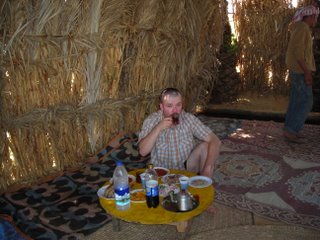
We left this tranquil setting and went on to a military stop, where Mahmoud had to give info about himself and say what nationality we were. We had heard from others that you are bound to get a military or police escort if you are an American tourist, and that this escort is like having a big target on you saying, Hey, Look at the Americans!, but we did not run into such trouble on our trip.
We then crossed into the White Desert, another landscape shift, and almost immediately pulled over to see Crystal Mountain, which is more like a hillock made entirely of – you guessed it – crystal. Slivers lay broken over the mountain, but this was the only site with an environmental protection sign, and you know how I am about rules, so none of you are getting crystals. But you may get a rock if you play your cards right.
From here we went off road, eventually coming upon the breathtaking panorama of a valley marking the beginning of the most interesting parts of the White Desert. We stopped here and gazed at the chalklike minerals, rippled like snowdrifts, against the side of the mountains. Then we entered the valley. Some parts of the floor were sheer rock, and Mahmoud took the jeep nearly sideways at the base of formations to stay out of the rock. We entered another large open patch with a white rock floor on which were scattered “flower rocks,” black and round with bulbous protrusions. We stopped here, and Mahmoud, having noticed my penchant for collecting the details of the earth, kept handing me rocks, each one stranger than the next.
The landscape changed again, this time scattered with shrubs and palms, many of them fallen over or dead. Samir said the Bedouins used to live here “200 or 300 years ago.” Samir was a great person to have around, but he was no historian. I soon learned to curb my questions about the history of places and just enjoy them for what I saw. What was clear was that the groves had outlived their usefulness – no water, no human life. We kept passing these old groves and turned onto a rockier landscape, the jeep shuddering as we dodged boulders. Suddenly a real oasis appeared, a small grove of palms with a natural spring. Mahmoud stopped to put water in the jeep. Someone had hung plastic bags of sugar, salt, and flour from the palm trees, which were loaded with colorful bunches of small dates.
Finally, we reached the most eerie and famous formations of the White Desert – mounds at first, like swollen thumbs dipped in salt and sugar. The first stop: “Ice Cream Valley,” consisting of scooped and swirled formations. Eventually, we came to “The Chicken,” which is two formations – one that looks like a flower or a mushroom, and the other shaped like a small hen clucking up at the flower. Both are situated on a round pedestal of rock as if they had deliberately been put on display.

Indeed, that’s the amazing thing about all of these formations – they look as if they, like the Sphinx, were purposely created and sculpted – lions, profiles of human faces, etc. – when the miracle is that they were simply made from erosion, deposits, wind – the whims of minerals and air. I guess a further miracle is that what we tend to see in these formations is ourselves.
The other day I was thinking about this tendency to see ourselves in inert objects and came upon a passage in a book called The Botany of Desire, in which Michael Pollan quotes Emerson: “Nature always wears the colors of the spirit.” In classical rhetoric, “colors” refer to tropes [this trope info was also revealed to me by Pollan], meaning that we cannot see or experience without preconceived notions, past experiences, or expectations coloring what we see. We think these formations in the White Desert imitate us rather than that we imitate them, or perhaps it goes deeper than imitation. The smallest crevice delights us only in that it seems to resemble ourselves and what we know. Sure, the desert was eerie, but the shapes were us – they could only be us.
All of this (with respect to Emerson, Pollan, DeLillo, and everyone else who has had thoughts such as this a million times before, of course) struck me when we pulled up to a formation and Samir said: “The Horse.” Even though I nodded my head in agreement, I could see nothing like a horse. I saw a large base and a smaller craggy bit jutting from the top. Meanwhile, J scrambled up a formation that seemed a bit big for his britches; nonetheless, he made it and paused like Superman surveying his heroics, chalk smattering his jeans. Then I peered at the horse and saw its long neck and its mane, exactly where I had been looking for it.
At this point, I must flash forward to the next day, when we watched the sun setting from English Mountain, a cliff with a crumbling rock house where some Brit used to live. The cliff offers a magnificent view of Bawiti and the sun, pink and dropping until it plops out of sight. We took a few pics before the sun actually set but then just watched the splendor, hands wrapped around our knees. As the sun sank, a woman behind us loudly lamented the faulty lighting of her camera, totally disregarding the miracle of the present because she couldn’t record it as a moment in the past.
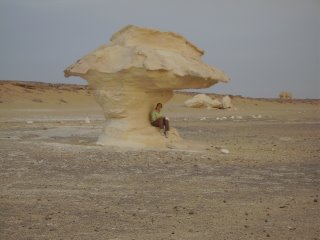
Let’s go back to The White Desert, though, where the sun is beginning to set just as we pull up to a formation called “The Mushroom,” which I sit under like Alice, watching the way other formations seem to change with the light, surfacing and submerging. Iftar comes, so Mahmoud and Samir chow. Then back to Bawiti and the hotel – a two hour drive.
We met other vehicles occasionally, which each time involved a conversation of lights flicking on and off: Are you there? Yes, I’m here. Do you see me? Yes, I do. Are you sure? You betcha. And one last flicker upon passing. I might add that no one seemed to have taillights. As soon as Samir fell asleep in the front, Mahmoud lit a cigarette. Later, when he tried it again, Samir woke and made him put it out. Their relationship all day was quite fun to watch – Samir telling Mahmoud how to drive, how to do things, Mahmoud talking back – both like biddies, which is the way many men interact in Egypt.
Back in Bawiti, the town bustled post-Iftar – children racing about, men smoking sheesha in open-air coffee shops, grocers selling fruit and spices and opened bags of grain, covered women leading children by the hand. Dusty and crazy, it was a bit much for me after the surreal day, so I headed to the room to shower and sleep. The shower was a head hanging from the wall, basically, so the whole bathroom got wet, but a drain in the floor made it more efficient than it looked.
Anyway, before that, I asked J to get me a lemon soda and some TP from Samir. He did this on his way out to dinner at the Popular Restaurant (worthy of its own post). A few minutes later, Samir and one of the other hotel guys come knocking on the door with a silver tray holding my can of lemon soda, a smudged glass, and a roll of TP. You don’t get THAT from the Hilton, now, do you? Then to bed for me, on the mattress with the red brick foundation, surprisingly comfy after a day in the desert.
Amanda




